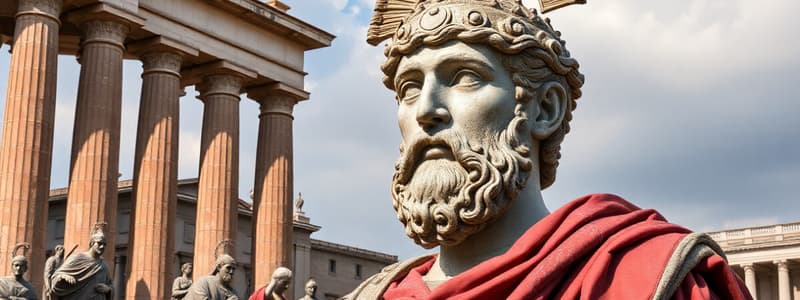Podcast
Questions and Answers
What annual power did Augustus gain that allowed him the right of veto on legislation?
What annual power did Augustus gain that allowed him the right of veto on legislation?
- Consular authority
- Imperial edict
- Tribunicia potestas (correct)
- Senatorial privilege
What position did Augustus hold that made him the supreme religious leader of Rome?
What position did Augustus hold that made him the supreme religious leader of Rome?
- Consul
- Princeps senatus
- Aedile
- Pontifex Maximus (correct)
Which title, awarded to Augustus in 2 BC, emphasized his role as the 'father of the country'?
Which title, awarded to Augustus in 2 BC, emphasized his role as the 'father of the country'?
- Cives Romanus
- Pater patriae (correct)
- Augustus Rex
- Imperator
What term is used to describe Augustus's ability to speak first in the senate?
What term is used to describe Augustus's ability to speak first in the senate?
What did Augustus’s rule evolve into despite its initial governmental framework?
What did Augustus’s rule evolve into despite its initial governmental framework?
What does the term 'Augustus' primarily signify in relation to Octavian's rule?
What does the term 'Augustus' primarily signify in relation to Octavian's rule?
Which term best represents Octavian's claim to military dominance?
Which term best represents Octavian's claim to military dominance?
What role did 'auctoritas' play in Octavian's rise to power?
What role did 'auctoritas' play in Octavian's rise to power?
Which practice is associated with the term 'augurium'?
Which practice is associated with the term 'augurium'?
What was a key aspect of Octavian's self-proclamation as a leader?
What was a key aspect of Octavian's self-proclamation as a leader?
Flashcards
Tribunicia potestas
Tribunicia potestas
The right of veto on legislation and personal inviolability, held by the tribunes of the plebs.
Pontifex Maximus
Pontifex Maximus
Chief priest of Rome, holding immense religious authority.
Pater patriae
Pater patriae
A title bestowed upon Augustus in 2 BC which translates to 'father of the country', further cementing his extraordinary position.
Princeps senatus
Princeps senatus
Signup and view all the flashcards
Principate
Principate
Signup and view all the flashcards
Augustus
Augustus
Signup and view all the flashcards
Imperium
Imperium
Signup and view all the flashcards
Potestas
Potestas
Signup and view all the flashcards
Auctoritas
Auctoritas
Signup and view all the flashcards
Octavian's Power
Octavian's Power
Signup and view all the flashcards
Study Notes
Augustan Principate
- Augustus's power grew incrementally, holding various positions and powers
- He received the tribunician power annually, a powerful prerogative of the plebeian tribunes.
- He held veto power over legislation and enjoyed personal authority.
- In 12 B.C., Augustus became Pontifex Maximus, the high priest of Rome, consolidating his religious authority.
- His rule lasted from 27 B.C. until 14 A.D.
Augustan Era's Political Design
- Augustus's rise to power involved a calculated political strategy, moving carefully through the Republican structures.
- Augustus became the princeps, a leader among equals initially, a subtle way to avoid absolute rule.
- His rule deviated from the Republican model, leading to an autocratic political system.
- This shift challenged Roman constitutional traditions and heralded a transition to an imperial regime.
Augustan Image and Power
- Augustus's strategy utilized public perception and self-presentation.
- Political and religious tools like public images were used.
- He aimed to appear as a worthy successor to Caesar, while staying within the republican context.
- He attempted to retain a respect for traditional Roman values and structures, even as he gradually accumulated more and more power.
Studying That Suits You
Use AI to generate personalized quizzes and flashcards to suit your learning preferences.



